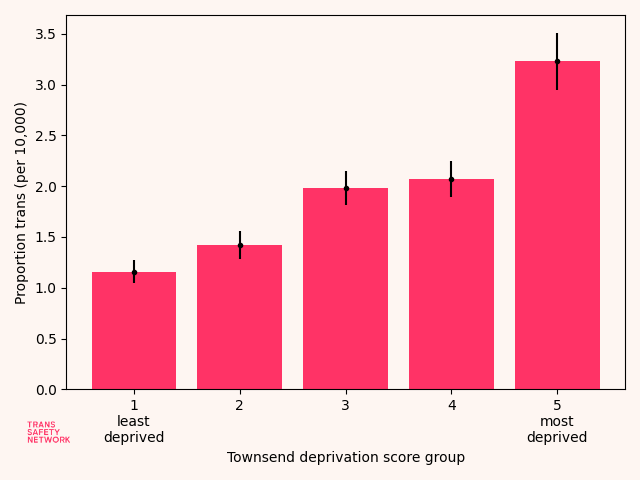
A new cohort study published in the British Medical Journal attempting to estimate the proportion of trans people registered with GPs across different areas of the UK has found that trans people are far more likely, on average, to live in deprived areas. The study looked at data for around 7 million patients across 649 GP practices throughout the UK and found that patients from the most deprived areas were “more than twice as likely to have a recorded transgender identity than individuals in the least deprived areas.”
Deprivation was measured using the Townsend deprivation index, a sociological instrument that scores areas based on levels of unemployment, car ownership, home ownership and overcrowding. These results are consistent with existing data on trans people in the UK who, per the most recent census, are 81% more likely to be unemployed than our cisgender peers and 66% more likely to be on disability benefits.
Trans experiences of workplace discrimination are well documented, with 1 in 3 employers in a 2018 survey admitting that they would be less likely to hire a trans person, mirroring the experience of the third of trans respondents to a 2021 Totaljobs survey on behalf of Sparkle who have experienced discrimination while applying for a job. In this context it is not exactly surprising that trans people are found in greater numbers in the poorest areas of the UK.
Trans identity was measured by looking at Read codes, codes used by GPs to identify which medical conditions a patient may have. As stated in the study, this measure is highly likely to underestimate the total trans population as some trans patients may be reluctant to disclose trans identity to medical professionals and some medical professionals may decline to record trans status for a patient who has not yet seen a specialist. Neither issue should be particularly surprising given the frequent experiences of discrimination and transphobia faced by trans people interacting with NHS services, 1 in 7 trans people responding to Trans Actual’s 2021 Trans lives survey reported being refused GP care because of their gender. It seems unlikely that trans people who have not disclosed their status to their GP or whose GP refuses to recognise their trans status would be any wealthier than other trans people, on average.
The findings from this study reinforce, once again, the need for trans liberation politics to take the material, economic impacts of transphobia seriously. Part of fighting against harm to trans people must be fighting against the myriad ways in which transphobia impoverishes and the disproportionate burden of transphobia on working class trans people.